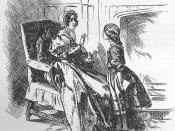The Impact of Conflicts in Literature Among the most significant traits in literature, characterization stands as one of the key factors in the impact a particular novel can have on a reader. Charlotte Bronte emphasizes the significance of characterization in her novel, Jane Eyre, through the main character, Jane, and the countless conflicts she must withstand before she is able to reach true bliss in her life. The conflicts in accordance to the different settings throughout the novel affect Jane's character tremendously.
First, the most horrendous setting for Jane is her only home at ten years of age, Gateshead Hall. Because Jane is a poor, orphaned child, her Aunt Reed along with the entire household show no compassion or affection toward Jane making her feel very unwelcome by the family. The first conflict in the novel shows that Jane is being unfairly treated: "...[John] struck suddenly and strongly" for no apparent reason (12).
Although John has no motif for his bratty and violent behavior, Jane is the one to be punished. This conflict reveals to the reader the kind and innocent nature of Jane, but at the same time, it also displays the inhumanity and the lack of compassion in the Reed family and the environment at Gateshead Hall. Because Mrs. Reed strives to make Jane's life miserable she succeeds in telling Jane's future advisor a lie about her to make him cruel and weary toward Jane. For instance, Mrs. Reed states, ""ÃÂI should be glad if the superintendent and teachers were requested to keep a strict eye on her, and , above all, to guard against her worst fault, a tendency to deceit"'(38). Because Mrs Reed envies Jane, she manipulates people in her pathway in order to make Jane appear to be a terrible, unkind person. Jane realizes how deceitful Mrs. Reed is and simply states, " Well might I dread, might I dislike Mrs. Reed; for it was her nature to wound me cruelly: never was I happy in her presence" (38). Jane does not try to criticize Mrs. Reed, but instead, she says, in a kind fashion, that she does not particularly care for Mrs. Reed. Jane's low self-confidence at Gateshead Hall is all due to her Aunt Reed; however, Jane is willing to forgive her for her cruel nature eventually which clearly displays her kind heart.
Second, another setting that proves not to be pleasurable for Jane is Lowood school where Jane is sent by Mrs. Reed. This school has very unfit conditions for young girls who crave attention because it is understaffed with poor heating in the winter and little or spoiled food most all the time. Jane did not grow fond of the environment to begin with; however, she began to despise it once Mr. Brocklehurst harshly humiliated her in front of everyone. Because Jane accidently drops her tablet and breaks it, Mr Brocklehurst exclaims to anyone who will listen to "ÃÂ"[f] etch that stool, [and] [p]lace that child upon it"'(73)! He wants to make Jane miserable just as Mrs. Reed and without any regard to her feelings. Although Jane is completely and utterly embarrassed, she learns to deal with his hypocritical nature and strive through life at Lowood making a very loving friend, Helen Burns. Because Helen helps Jane through some rough times and is always there to listen, Jane is heart broken when Helen becomes deathly ill; however, Helen stays strong and assures Jane that everything is going to be fine. Helen states, "ÃÂ"You came to bid me good-bye then: you are just in time probably...when you hear that I am dead, you must be sure and not grieve"' (90). Through Jane's admiration for Helen, she learns to stay strong no matter what life may throw in her path and to cherish the love in her heart.
Lastly, the most chaotic yet enjoyable setting for Jane proves to be Thornfield because she finally finds her place in a family and love that cannot be broken. Jane comes to Thornfield only expecting to work as a governess for a young girl long enough to make a sufficient amount of money in order to build her own little school; however, Jane quickly finds much more than a simple job here. She finds a family in the servants and the child which she has longed for for the majority of her life. Moreover, Jane finds true love in Rochester, the head of Thornfield. Because Jane considers herself low-class in comparison to Rochester, she is completely shocked when he says to her, ""ÃÂ...I summon you as my wife: it is you only I intend to marry"'(278). Of course, Jane eventually accepts but not without hesitation due to simple amazement. Because Jane has a problem in trusting due to her past experiences with people who were supposed to protect her, Jane does not readily accept what has probably been a fantasy of hers for some time. Jane's hesitation proves to be necessary when her and Rochester's ceremony is interrupted to announce that her beloved Rochester is already married. This comes as a genuine heartbreak to Jane which is why she does not instantly accept Rochester's sympathetic and apologetic words: ""ÃÂJane, I will not trouble you with abominable details; I lived with that woman upstairs four years, and before that time she had tried me indeed: her character ripened and developed with frightful rapidity"' (334). Rochester tries to explain to Jane that Bertha is mad, and although they are legally married, in his heart, they have not been married for years. He wants Jane to accept that he loves her, but Jane has trouble with this. Although in the end, they are blissfully joined in marriage, Jane learns from this experience that love usually comes with a price and that true love is worth paying that price.
In closing, through the endless conflicts Jane encounters, she learns several life lessons that she can carry with her and cherish forever. Her character has been changed significantly from an unloved young girl to a cherished wife and motherly role model. Jane also realizes that certain people simply have harsh and cruel souls and that not everyone is unkind and untrustworthy. This novel contains verisimilitude in that it can easily pertain to everyday society when a young girl who does not feel loved grows up not trusting anything, but eventually through the few special people in this world, she can learn to do anything in life.





